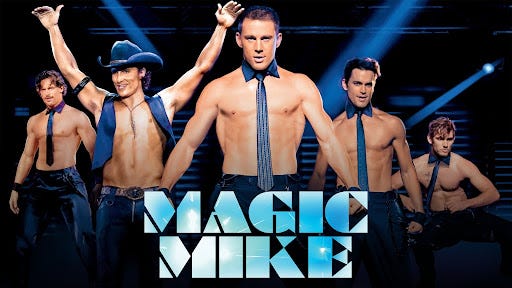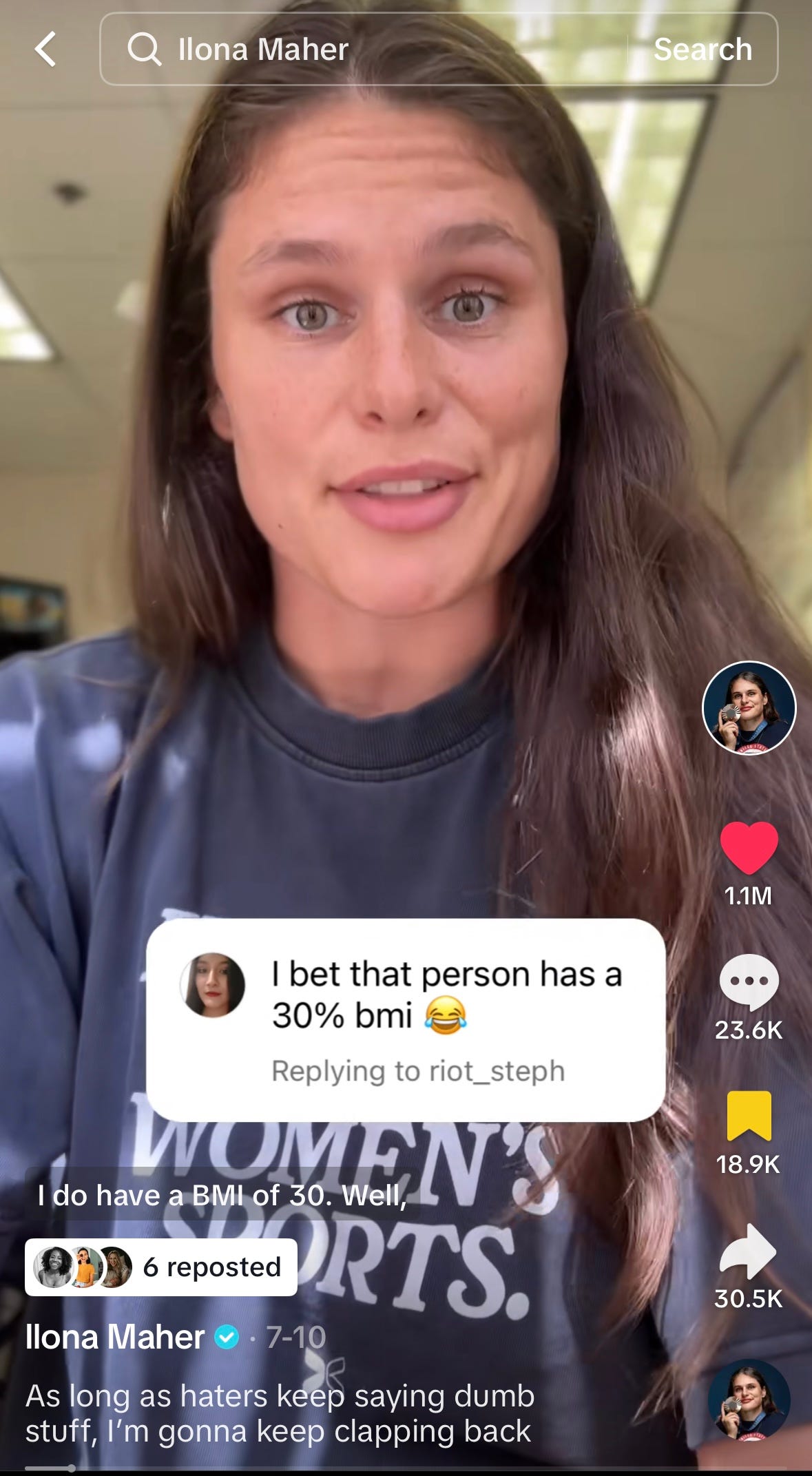Bodies aren't business cards
“But alas, I’m going to the Olympics and you're not.” - the ever iconic Ilona Maher in response to a troll on social media. I think we should all have this energy for anyone feeling the need to judge.
Before getting into the newsletter, this is another reminder that on Tuesday, August 13th, I am having a book launch! Yes, “Live Nourished” will officially be on the shelves on that date, and I am going to have an official launch celebration hosted by Cafe con Libros and a fun talk with my good friend and fellow author and Substacker, Chrissy King! Please click this link for all the details here for tickets and location. I would love to see all of you IRL (in real life.)
Okay, now on to today’s newsletter!
Look at that body! Look at that hard work! This was on a yacht in Bali, which sounds way fancier than it was. It was a boat that was taking our group snorkeling, which was indeed a beautiful time. We had 3 instructors who were with us the entire time, both in the water and also making sure we were okay in the boat. I have great memories of this trip, including how clear the skies were and how amazing the water felt, but one of the memories was from my companions, who kept commenting on one of the instructor’s body.
Here’s the thing: I admired him because he had such a great eye in the water and would point out fish and turtles that I didn’t even see. Everyone else found him amazing because of his visible abdominal muscles, aka the six-pack on his chest. Instantly because of his body, he was suddenly deemed the pillar of health and wellness and in the utmost level of fitness based on his body alone. I want to make it clear that I was also impressed because swimming in the open sea for days on end is quite the feat, and also, deep diving to the bottom requires stamina. I’m not knocking that at all, but it’s interesting that those points were never mentioned when talking about his fitness level. Just his physical body.
And if we are actually talking about health, why aren’t we actually talking about health behaviors? After a few hours of diving and swimming, we went to a beach club for lunch. Not to be weird, but I definitely noticed our instructors who were off to the side on break using that time to eat and smoke cigarettes. And I’m not talking just a single cigarette; I’m talking multiple, one after the other. Yes, our six-pack pillar of health instructor was chain smoking during lunch. I want to make it clear that I am not judging the morality of someone who chooses to smoke or partake in other behaviors. I am simply sometimes astonished that we tend to overlook certain behaviors and put people on a pedestal for being “in shape” and “in perfect health” simply based on how they look. In other words, we say health standards when we should really say beauty standards.
Bodies are not business cards. When we look at business cards, they tell us the information about a person. Details such as contact information and the name and even title of a person. Important details can be found on that square piece of paper that is exchanged between people. Bodies are not that. We sometimes think we can tell all about someone based on how they look. This is due to biases and stereotypes that we have learned and have been ingrained in us since childhood. It’s not a comfortable feeling to admit that we have biases, but we all have them, and it is important to constantly work to undo them. Again, sitting in discomfort is the hardest part.
We can look at someone’s race, ethnicity, gender, sexual orientation, and more identities and make assumptions. We can also do this with bodies. We assume that those with larger bodies are unhealthy and perhaps don’t eat nourishing foods or exercise. But the thing is that bodies are diverse, and there are indeed many folks in larger bodies who are exercising daily and eating nutrient-dense foods. At the same time, I see on my social media feed so many people who are thin, partaking in harmful trends or restrictive habits that are often ignored by the mass public simply because they are thin. I want to make it clear that health is also dependent on so many factors, in addition to how we eat and move, but many folks do not have access because of systems in place. I wrote about this in my last newsletter.
Who remembers the movie “Magic Mike?” I certainly remember all of the frenzy surrounding the movie due to the very unclothed actor Channing Tatum. What I remember the most when the movie first came out were the think pieces regarding how the actor got his look and “got healthy” that were being made. Visible muscles are such a pillar for society’s perspective on what health is. We are told it represents hard work and willpower to look that way, but at what cost? I found Tatum’s discussion on his Magic Mike physique to be a breath of fresh air. Yes, seriously. On the Kelly Clarkson Show, Tatum explained, “It’s hard to look like that. Even if you do work out, to be that kind of in shape is not natural. That’s not even healthy. You have to starve yourself. I don’t think when you’re that lean, it’s actually healthy. I don’t know how people who work a 9-to-5 actually stay in shape because it’s my full-time job, and I can barely do it.” Boom, and there it is. Tatum admitting that if we are talking about health, no the actions taken to get to that Magic Mike physique, are not healthy. Cosmopolitan reports that “treating getting in not-at-all-natural and very-possibly-not-at-all-healthy shape like his full-time job meant Channing had to work out twice a day and eat “completely right” (which, spoiler alert, translates to “completely without flavor,” apparently.)
If you are watching the Olympics (I mean, who isn’t?), you are viewing a display of various body types performing various athletic skills. Getting to the Olympics is no easy feat. You literally have to be the best in your field to represent your country at this event. Even so, different athletes have come under scrutiny because of their physiques. Yes, the athletes who have defeated all obstacles to compete at this elite level in Paris, France this year, are being judged on their appearance.
Let’s take women’s rugby player Ilona Maher, who has been documenting her experience in Paris, garnering new fans with her comedic take. On July 10th, Maher took to her TikTok page to address a rude (and, of course, unnecessary) comment left on one of her videos. The commenter said, “I bet that person has a 30% bmi *laughing emoji*” View the whole video here.
The brilliance of her response came when she started by saying, “I think you were trying to roast me, but this is actually fact. I do have a BMI of 30.” If we are still going by the antiquated formula of BMI ( and we really shouldn’t), a BMI of 25-29.9 is considered “overweight.” Just to also shamelessly plug that, I have a whole chapter about why the BMI system is antiquated and incorrect to use in my new book “Live Nourished.” *Shameless plug* I am also a weight-inclusive dietitian who believes that a bunch of numbers doesn’t give a full look into the actual person or the health of that person. It certainly doesn’t in Maher’s case, as she pointed out that she has looked like this her entire life and works with a dietitian, as many athletes do. “That BMI really doesn’t tell you what I can do; it doesn’t tell you what I can do on the field. How fit I am.” She is 100% correct in this regard because a bunch of numbers cannot tell us about the person in front of us. It cannot give the whole picture of someone’s health status. I am not a fan of using it and many health professionals also are becoming weary of it because of its flaws.
Yes, the BMI mislabels athletes as “overweight” because it doesn’t take into consideration muscle mass, but it also is used to discriminate. It is used in determining who can seek help in many eating disorder clinics and who can get certain insurance coverage for healthcare. It is not great and was also founded by a eugenicist who was set on determining the measurements for the “ideal white man.” So yes, a flawed system that maybe we should not be using. But this further proves how little someone’s physical appearance tells us about who they are as a person.
The snorkeling instructor in Bali had an athletic physique that was deemed the epitome of health. He also smoked more than a pack of cigarettes a day. Channing Tatum has a desirable physique that he seemed to work hard for because he is a paid actor, and a big-name studio was paying him to look like that because it was his job. He also said himself that the lifestlye was in no way sustainable or even tolerable. Ilona Maher is an Olympic medalist, which is an amazing accomplishment for any human (in my opinion.) She also has a BMI of 30 and is looked at as undesirable (by society, perhaps) because of her physicality alone. Even though she is an elite athlete who just won a bronze medal. We look at different physiques and judge them, but in no way do these physiques alone give us the full picture of the person. Bodies aren’t business cards.
Just another reminder about the book launch for “Live Nourished” on August 13th. These are the details, and tickets can be purchased now.
And, of course, my book “Live Nourished: Make Peace with Food, Banish Body Shame, and Reclaim Joy” is available for preorder now.











Absolutely true, BMI is complete and total garbage. "The Rock" is morbidly obese by these standards. It's ridiculous. I like to focus on health over size. If you eat well, exercise, and your blood work is good, the size of your body shouldn't matter.
I love all the bodies competing in this Olympics! And this is a great round-up of why looking “healthy” isn’t the same as actual health.